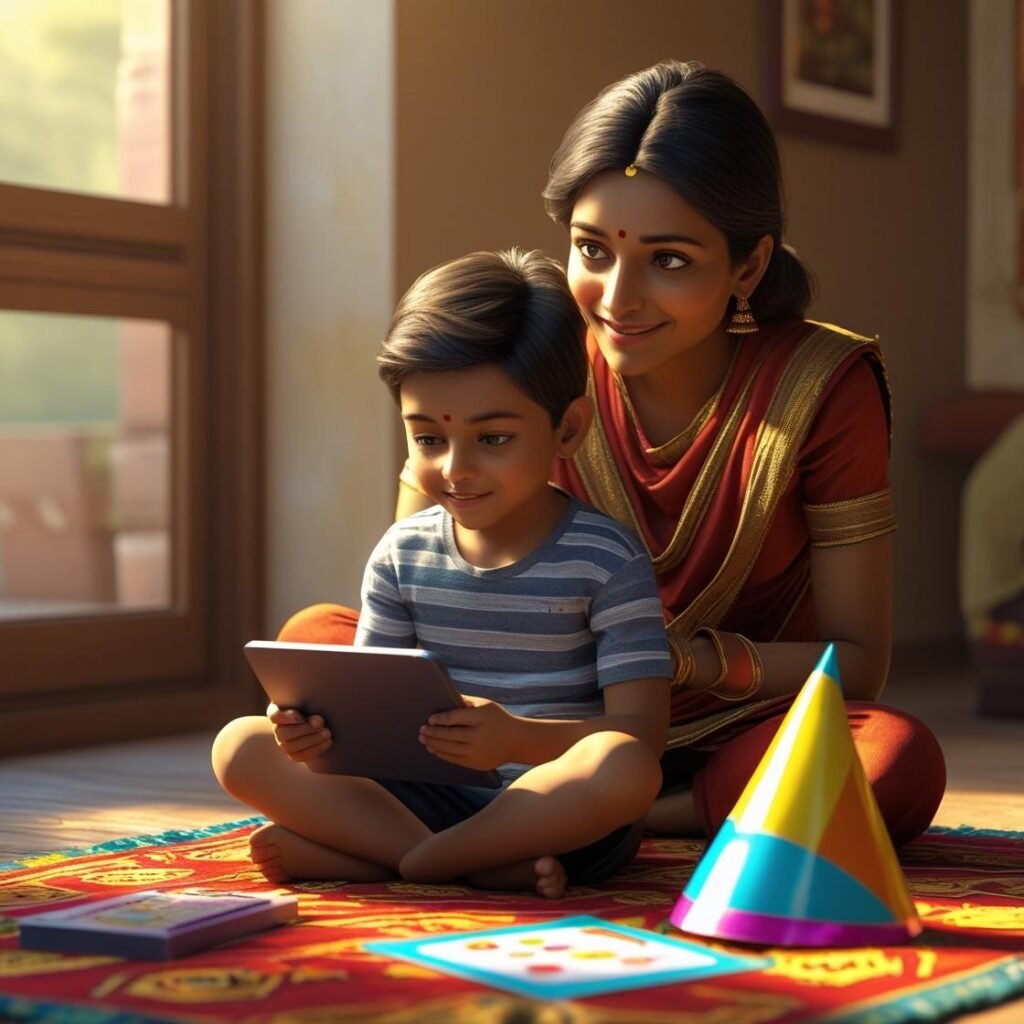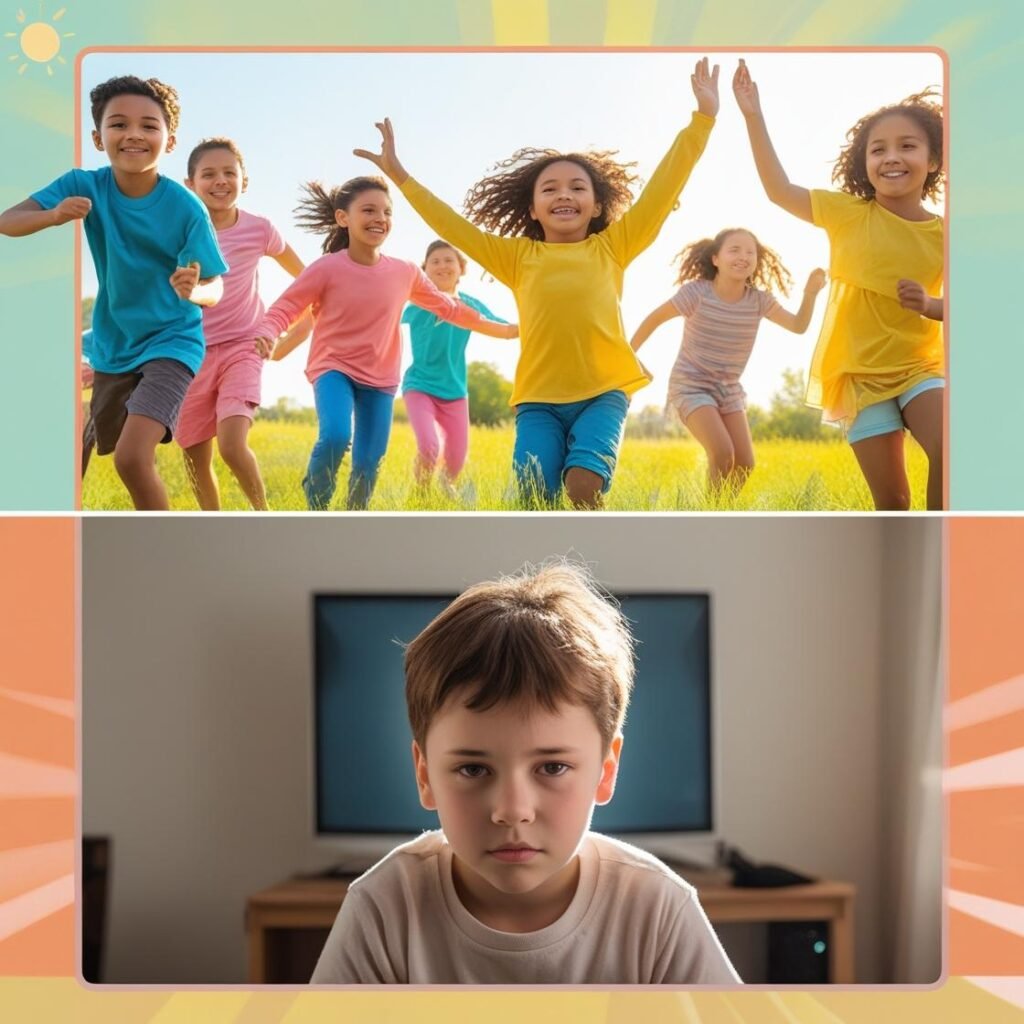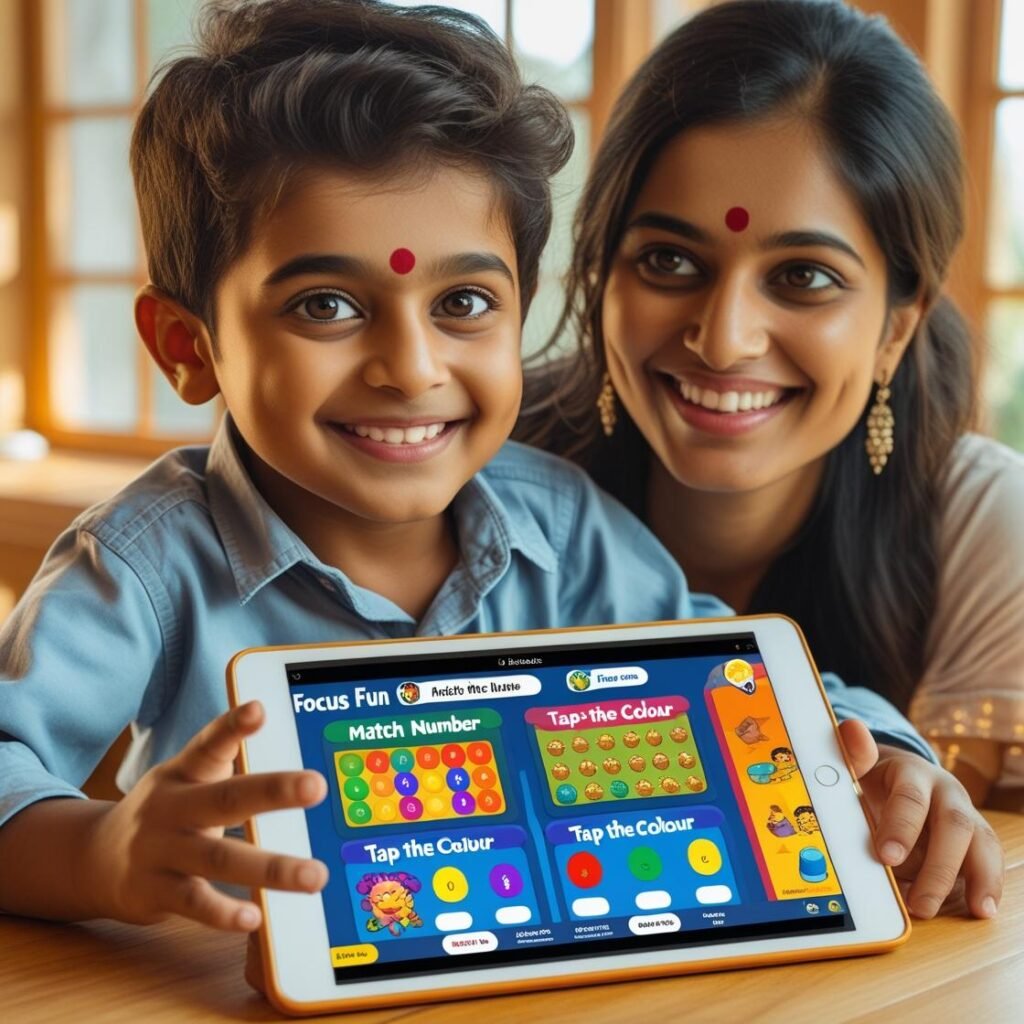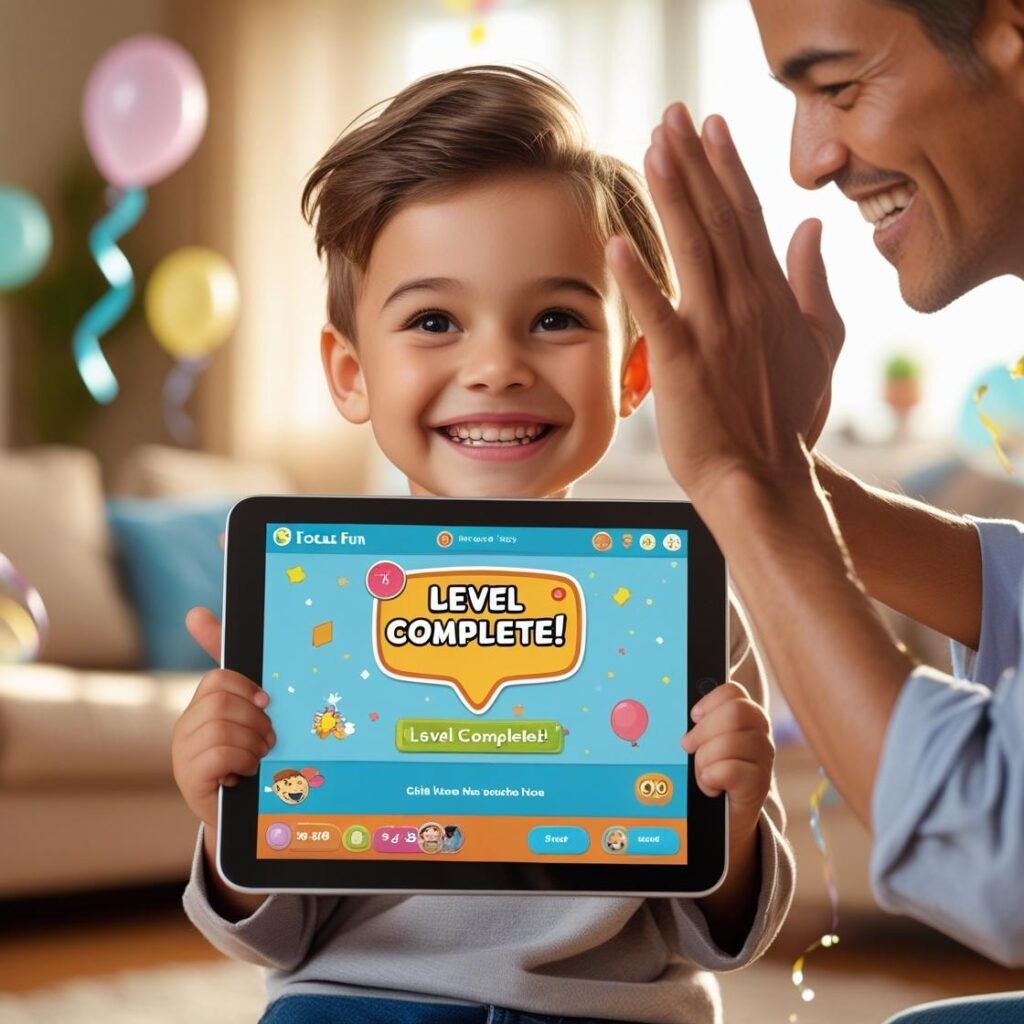Table of Contents
In today’s fast-paced digital world, many children are spending more time with screens than with people—and most parents don’t realize the consequences until it’s too late. When a child withdraws from friends, stops initiating conversations, or seems lost in a digital world, it’s often a sign of a deeper issue: Kids Screen Isolation.
But here’s the good news—you’re not powerless. With awareness, empathy, and tools like the Focus Fun app, parents can gently guide their children back toward connection, curiosity, and real-life joy.
When Vihaan Chose the Tablet Over Friends

Vihaan, once a joyful, giggly 7-year-old, had slowly become quiet. He preferred cartoons over cricket, game apps over giggles with cousins. His mother Neelam noticed it when he refused to go to his best friend’s birthday party, saying, “There’s a new level in my game I need to finish.” It was subtle—but heartbreaking. Her son wasn’t misbehaving. He was just… fading. Vihaan had slipped into Kids Screen Isolation, and Neelam knew it was time to act. She didn’t want a fight over screens. She wanted a way to reconnect—calmly, meaningfully. That’s when she discovered the Focus Fun app, designed not just to limit screens, but to transform how children interact with them.
What Is Kids Screen Isolation (And Why It Matters)

Kids Screen Isolation is a growing psychological concern where excessive solo screen time begins to replace real-world interaction. It isn’t just about how many hours a child spends in front of a device—it’s about what they’re losing in the process: eye contact, conversation, confidence, imagination. When screens become a child’s primary source of entertainment, comfort, and attention, the child slowly detaches from relationships and reality. They stop seeking connection. And over time, this emotional disconnection impacts brain development, empathy, and even academic performance. The Focus Fun app understands this delicate balance. It doesn’t just control screen time—it redirects it toward mindful, learning-driven interactions that spark creativity instead of isolating the mind.
The Long-Term Impact of Kids Screen Isolation
The effects of Kids Screen Isolation unfold silently. Your child might still smile at times, but they’ve stopped sharing stories, making eye contact, or laughing in the moment. Research shows that isolated screen usage can delay social development, increase anxiety, and reduce problem-solving ability. Children experiencing prolonged screen isolation often report sleep disturbances, frustration, and a reduced interest in group activities. The Focus Fun app was developed with child psychology principles in mind—aiming to replace passive scrolling with interactive brain-boosting games and quizzes that encourage kids to think, explore, and reconnect with their natural curiosity.
5 Gentle Ways to Reverse Kids Screen Isolation with Focus Fun
You don’t need to take devices away. What you need is to reshape how your child experiences screen time—with guidance, intention, and smart tools like Focus Fun.
1. Start with a 10-Minute Focus Together Ritual
Before handing over the device, take 10 minutes to bond—whether it’s storytelling, sharing highlights from the day, or drawing together. Then open Focus Fun and let your child explore its educational games, so that screen time begins with connection, not separation.

2. Let Focus Fun Replace Passive Apps
Instead of isolating apps that only serve flashy entertainment, introduce Focus Fun’s learning games like Match the Number or Tap the Colour. These games are designed to build memory, sharpen attention, and stimulate curiosity—keeping your child engaged while reducing the lonely effect of Kids Screen Isolation.
3. Set “Active Screen Hours” with Focus Fun
Designate certain hours as “Focus Fun Time”—where screens are used only for mindful learning, not scrolling or streaming. This helps children see screens as tools for growth, not escape. With puzzles, math games, and memory boosters, Focus Fun naturally reduces screen dependency while promoting mental stimulation.
4. Use the Quiz Game as a Bonding Activity
Play the Quiz Game from the Focus Fun app with your child. Compete for answers, celebrate small wins, and encourage learning together. This simple activity not only replaces solo screen time but also builds parent-child interaction that actively fights Kids Screen Isolation.
5. Celebrate Focus Fun Milestones
Instead of tracking how little screen time your child used, celebrate Focus Fun milestones—like when they chose to complete a learning level instead of watching random videos. This positive reinforcement helps your child associate screen time with growth and family pride, not detachment.
One App, One Shift: Beating Kids Screen Isolation with Focus Fun

Kids Screen Isolation doesn’t mean your child is lost in screens forever. It means they’re waiting for guidance—someone to show them a healthier way. That’s exactly what Focus Fun was built for. It’s not just an app. It’s a movement. A mindful companion that transforms screens into tools for focus, learning, and shared joy.
Parents like Neelam are using Focus Fun not to “limit” their kids—but to elevate their screen time with purpose. You can too. Start today by downloading the app and sitting down for 10 screen-free minutes with your child. Then, open Focus Fun and watch curiosity replace passivity.
Because your child doesn’t need fewer screens—they need smarter screens.
And Focus Fun is the smartest screen companion your child will ever need.
FAQ’s
1. What exactly is Kids Screen Isolation, and how is it different from regular screen time?
Kids Screen Isolation refers to the emotional detachment and loneliness children can experience when they spend excessive time on screens instead of engaging with family, friends, or the real world. It’s more harmful than general screen use because it disrupts emotional growth and connection.
2. How do I know if my child is affected by Kids Screen Isolation?
If your child frequently avoids social play, seems withdrawn, reacts emotionally when asked to leave screens, or struggles to express feelings, these may be signs of Kids Screen Isolation.
3. Can Kids Screen Isolation impact brain development?
Yes. Research shows that long-term screen isolation can lead to reduced empathy, attention span issues, language delays, and emotional numbness. Early intervention can help prevent long-lasting effects.
4. How can I help reverse the effects of Kids Screen Isolation?
Start by introducing meaningful, interactive alternatives like learning-based screen time. Apps like Focus Fun are designed to shift screen time from passive to purposeful without overwhelming the child.
5. How does Focus Fun address Kids Screen Isolation?
Focus Fun helps replace isolating content with memory games, problem-solving tasks, and creative thinking activities. It encourages children to interact with the app in ways that stimulate learning, not withdrawal.
6. My child is glued to their tablet. What can I do?
Begin by setting consistent screen-time boundaries. Replace mindless scrolling with engaging apps like Focus Fun, schedule family time, and model balanced digital habits yourself.
7. How much screen time is considered safe for kids?
Experts suggest no more than 1–2 hours of quality screen time per day for kids aged 5–12. Learning apps, educational videos, or screen-free days help balance digital exposure.
8. Can apps really support learning while reducing screen addiction?
Absolutely. When used with intention, apps like Focus Fun can build vocabulary, improve focus, and make screen time feel productive—offering a win-win for both kids and parents.
9. What age group is Focus Fun suitable for?
Focus Fun is ideal for children aged 4–12. It adapts its content to match the child’s learning stage and keeps them engaged without overstimulating them with flashy, addictive features.
10. Should I completely eliminate screen time to avoid Kids Screen Isolation?
Not necessarily. The goal is balance, not elimination. Smart screen time—like what Focus Fun provides—can be a powerful tool for learning and connection when used mindfully.
